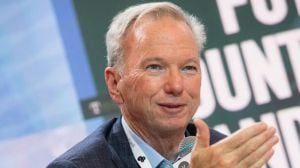Some online investors can’t seem to say no to playing the market
WASHINGTON, AUGUST 4: For many Americans, online trading has gone from a novelty to a fixation in the space of just a few years. In homes ...

WASHINGTON, AUGUST 4: For many Americans, online trading has gone from a novelty to a fixation in the space of just a few years. In homes and offices everywhere, it’s helped turn the personal computer into a round-the-clock casino, letting people who wouldn’t otherwise think of themselves as gamblers plunge into endless hours of high-risk speculation. Fast Internet connections, low-cost brokerage services and the long bull market have all inspired more investors to become heavy traders – and for some of them, even when trouble ensues, it is hard to stop.
Paula Stringham, a 36-year-old stay-at-home mom in San Antonio, had to ask her husband for $2,900 to meet margin calls this spring after her brokerage account lost 20 per cent of its value. "Trading is addictive. There is no doubt in my mind that if I had to quit altogether, it would be very difficult," she says. After she and her husband had a heart-to-heart chat, Stringham agreed to scale back her trading, but that strategy hasn’t been profitable either. "I wish I could go back to 1999 … and never day-trade and never get myself into this mess," she adds.
Christopher Rugowski, a 23-year-old Rochester, Minn., Web-site designer, says he had to stop following the stock market while he was in college because it nearly cost him his degree. "It was tough to go to class when the market was open," he says. Now he trades options on the side and sometimes thinks about trading full time. At his office, he uses his computer to stay plugged into the market. The first thing he does when he gets out of bed on weekdays is to tune in business-news channel CNBC. "I have it going on two TVs in the morning. I crank it up so I can hear it while I’m taking a shower or cooking breakfast."
Setting out on his 45-minute commute from his Oceanside, NY, home one recent morning, Dr David Gleitman, a podiatrist, turns on his cell phone, hooks on an earpiece and places a Palm IIIx organizer by his side. Though he doesn’t trade every day, his account is active enough that his broker, Charles Schwab Corp, offered him the chance to test the Palm to trade stocks and get price quotes. But the Palm isn’t fast enough for Dr Gleitman, and it is hard to use while he drives his Acura. So Dr. Gleitman maintains a second brokerage account, with Citibank, to get instant stock quotes over his cell phone.
"The worst part of the morning is going in for the drive," he complains. "I’m in a void." When he arrives at his storefront office in Brooklyn’s working-class Flatbush neighborhood, Dr. Gleitman enters a cramped room where he used to do surgery. He quickly boots up the laptop computer that contains patient records and his trading account, filled with stocks such as Broadcom Corp, Rambus Inc and JDS Uniphase Corp.
Dr Gleitman sifts through the mail and shrugs as he opens a mailgram from Schwab. It’s a margin call, which Schwab had alerted him to by phone the previous day. Since then, however, stocks have climbed, so he no longer needs to put up more cash or sell stock to bring his debt down to within Schwab’s limits. "I try to ride calls to the last minute," he says. But he wasn’t always so sanguine. "The first time around, I got really freaked out," he recalls.
After the market’s collapse, he cut back on his borrowing. Now, it has edged back up again. On a recent day, Dr Gleitman looks at his pager and sees that Richard Kappler, a Schwab customer-service representative, is trying to reach him about a margin call. "It’s the angel of death calling," the podiatrist says. Returning the call, he assures Mr. Kappler that he’s on top of the situation.
Dr Gleitman says he hardly ever plays lotto, and recalls only one visit to a racetrack. Nor has he invested all of his savings in trading; he says his house is paid off and he has "may be $200,000" set aside in separate accounts to help pay for his retirement and his three children’s college education. But he recently read a book, "Trading for a Living," that was written by a psychiatrist who also is a trader. "There are incredible parallels" between trading and gambling, Dr Gleitman says. "All the thrills are there when you make the right trade. There is absolutely no difference."
Then, disaster. Dr Gleitman was flying to West Palm Beach, Fla, for a family vacation on Friday, April 14, when the Nasdaq market plunged a record 355.49 points, or 9.7 per cent. His portfolio shrank more than $100,000 in a single day. "I got myself some medication" for high blood pressure, he says. Later that evening, he put his children to bed and, as the sun was rising, traded strategies and consoling words with fellow investors he knew from the Silicon Investor Web site. "It comes and it goes, but it also comes again," he says. "It’s part of the American dream."
— (WSJ)






- 01
- 02
- 03
- 04
- 05

























